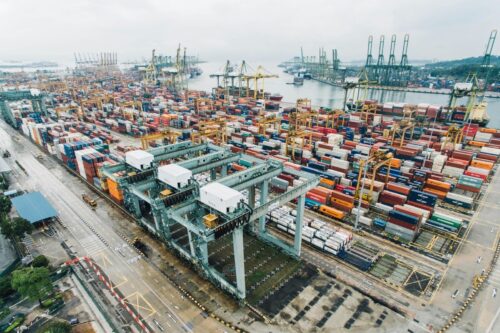What is Wholesaling? Definition, Components, and Challenges and Solutions

Wholesaling is a critical aspect of commercial shipping. But what is wholesaling? It acts as the intermediary link between manufacturers and retailers in the supply chain. Efficient wholesale shipping ensures smooth logistics operations and timely delivery to the end consumer.
In this guide, we will clarify the definition, components, challenges, and solutions of wholesale shipping and offer insights and strategies for retail businesses and investors.
Whether you’re managing smaller quantities of inventory, optimizing distribution networks, or overcoming logistical hurdles, this comprehensive guide will educate you and provide you with the basics and tools necessary to thrive in the dynamic world of wholesale shipping.
Understanding Wholesale Shipping in Commercial Trade
Wholesale shipping focuses on bulk transportation of goods from manufacturers to retailers or businesses. It underpins supply chains by efficiently moving products in larger quantities and specialized logistics.
In global trade, wholesale shipping serves as a link connecting manufacturers, distributors, wholesalers, retailers, and the end consumer. Most wholesalers can distribute effectively, reduce costs, and access broader markets with this option.
Whether you own a real estate company or an eCommerce store, wholesaling facilitates the movement of goods across continents. Understanding wholesale shipping dynamics can reduce the higher price of transportation and sometimes helps your company to make sales directly across borders.
Key Components of Wholesale Shipping Operations

Wholesale shipping operations have three important components. Each of them ensures the efficient movement of goods across supply chains. Here, we explore key aspects integral to wholesale shipping:
Bulk Cargo Handling and Management
Bulk cargo handling and management are central to wholesale shipping operations. This involves the loading, unloading, and transporting of large quantities of goods. These goods often come in standardized packaging or containers.
Efficient handling techniques, such as palletization and containerization, streamline the movement of bulk cargo. They reduce loading and unloading times while minimizing the risk of damage.
An expert can help you understand the critical components in detail. Advanced equipment and machinery, including forklifts and conveyor belts, are key in facilitating smooth cargo handling processes.
Logistics and Distribution Networks
Logistics and distribution networks form the backbone of wholesale shipping operations. These networks encompass a variety of interconnected nodes, including warehouses, distribution centers, transportation hubs, and delivery routes.
Effective logistics management involves optimizing routes, scheduling shipments, and coordinating transportation modes.
It helps many wholesalers to maximize efficiency and minimize the price. Advanced technologies like GPS tracking systems and route optimization software enable real-time monitoring. So, a manufacturer, a vendor, or a set of companies can adjust the logistics operations to enhance adaptability.
Seamless integration between suppliers, manufacturers, distributors, and retailers can ensure the smooth flow of inventory through the distribution network from production facilities to the end user.
Inventory Management Strategies
Inventory management is the heart of successful wholesale shipping operations. Effective inventory management strategies aim to balance supply and demand while minimizing carrying costs and stockouts.
Just-in-time (JIT) inventory systems help optimize inventory levels by synchronizing production schedules with customer demand. It reduces an excess number of stock and storage costs. Additionally, inventory forecasting techniques leverage historical data and market trends to anticipate demand fluctuations.
It can help wholesalers, resellers, and middlemen to adjust inventory levels accordingly. Advanced inventory management software can give you real-time visibility into inventory levels. It enables proactive decision-making and inventory optimization.
Robust inventory management strategies can increase operational efficiency, maximize product availability, and meet customer expectations in wholesale shipping operations.
Challenges and Solutions in Wholesale Shipping
While wholesale shipping presents potential challenges, numerous solutions can resolve the issue and carry smooth operations. Here, we address key challenges and provide insights into mitigating them:
Navigating Customs and Regulatory Compliance
Wholesale shipping often involves navigating complex customs clearance regulations and regulatory compliance requirements. They can vary significantly across different countries and regions. Your business must be aware of evolving customs laws and regulations to overcome these challenges.
You should maintain accurate documentation and collaborate closely with customs brokers and regulatory authorities. Implementing robust compliance protocols and investing in specialized training for personnel can help mitigate the risk of non-compliance.
It can avoid costly delays or penalties. Leveraging technology solutions, such as automated compliance software and electronic document management systems, streamline customs clearance processes.
Managing Shipping Costs
Managing shipping costs is a massive challenge for businesses engaged in wholesale shipping operations. Rising fuel prices, fluctuating transportation rates, and unpredictable market conditions can significantly impact shipping expenses.
It can lower your profits and affect the capital. Hence, businesses must adopt proactive cost management strategies to optimize shipping processes. This includes negotiating favorable freight rates with carriers and consolidating shipments to maximize container space utilization.
You can also explore alternative transportation modes, such as rail or intermodal transport, to reduce shipping costs. Additionally, leveraging data analytics and performance metrics enables businesses to identify cost-saving opportunities.
You may optimize route planning and streamline supply chain operations with data analytics. It ultimately enhances cost efficiency and competitiveness in the wholesale shipping industry.
Technology Integration in Wholesale Shipping
Technology integration can increase efficiency and transparency in wholesale shipping operations. With tracking and monitoring systems, businesses can gain real-time visibility into the movement of stocks throughout the supply chain.
Implementing cloud-based logistics platforms and digital freight management systems streamlines order processing, inventory tracking, and shipment management. Moreover, the IoT (integration of Internet of Things) devices and sensor technology enable remote monitoring of cargo conditions, such as temperature and humidity.
It ensures compliance with quality standards and regulatory requirements. Plus, emerging technology, such as blockchain and artificial intelligence, offers opportunities to enhance data security, traceability, and automation in wholesale shipping.
By embracing technology-driven solutions, businesses can overcome logistical challenges and unlock new growth opportunities.
Benefits of Optimized Wholesale Shipping
Optimizing wholesale shipping processes offers several advantages for businesses. Here is a glimpse of better operation management:
Improving Business Efficiency
Efficient wholesale shipping streamlines operations. It reduces lead times and minimizes bottlenecks in the supply chain. Businesses can enhance resource utilization by optimizing transportation routes and implementing advanced tracking systems. Improved inventory management and order fulfillment processes ensure timely delivery of goods.
It reduces stockouts and enhances overall productivity. Furthermore, streamlined communication and collaboration among stakeholders foster smoother coordination, driving operational excellence across the organization.
Enhancing Customer Satisfaction
Reliable wholesale shipping practices contribute to customer satisfaction and foster long-term loyalty. Timely and accurate delivery of goods ensures that customers receive their orders promptly. You can minimize delivery errors, damages, and delays with reliable wholesaling. Your business can build trust among your customers.
Ultimately, you can establish a positive reputation for reliability and professionalism. Additionally, transparent and proactive communication regarding shipment status and tracking information enables customers to stay informed throughout the delivery process.
Final Thoughts
We hope this wholesaling guide has provided a comprehensive overview of wholesale shipping. You can make an informed decision by exploring its components, challenges, and solutions.
The key components of wholesale shipping operations will empower you to select the trusted partner for your logistics needs.
Furthermore, the challenges businesses face in navigating customs compliance, such as shipping costs and integrating technology, can help you to stay competitive in the dynamic market.
Businesses can invest in advanced technologies, implement best practices, and foster collaboration across the supply chain. It can help you overcome challenges and capitalize on opportunities in the landscape of commercial trade. If you are unsure about the regulatory guidelines or minimizing the cost, you can rely on trustworthy experts.
